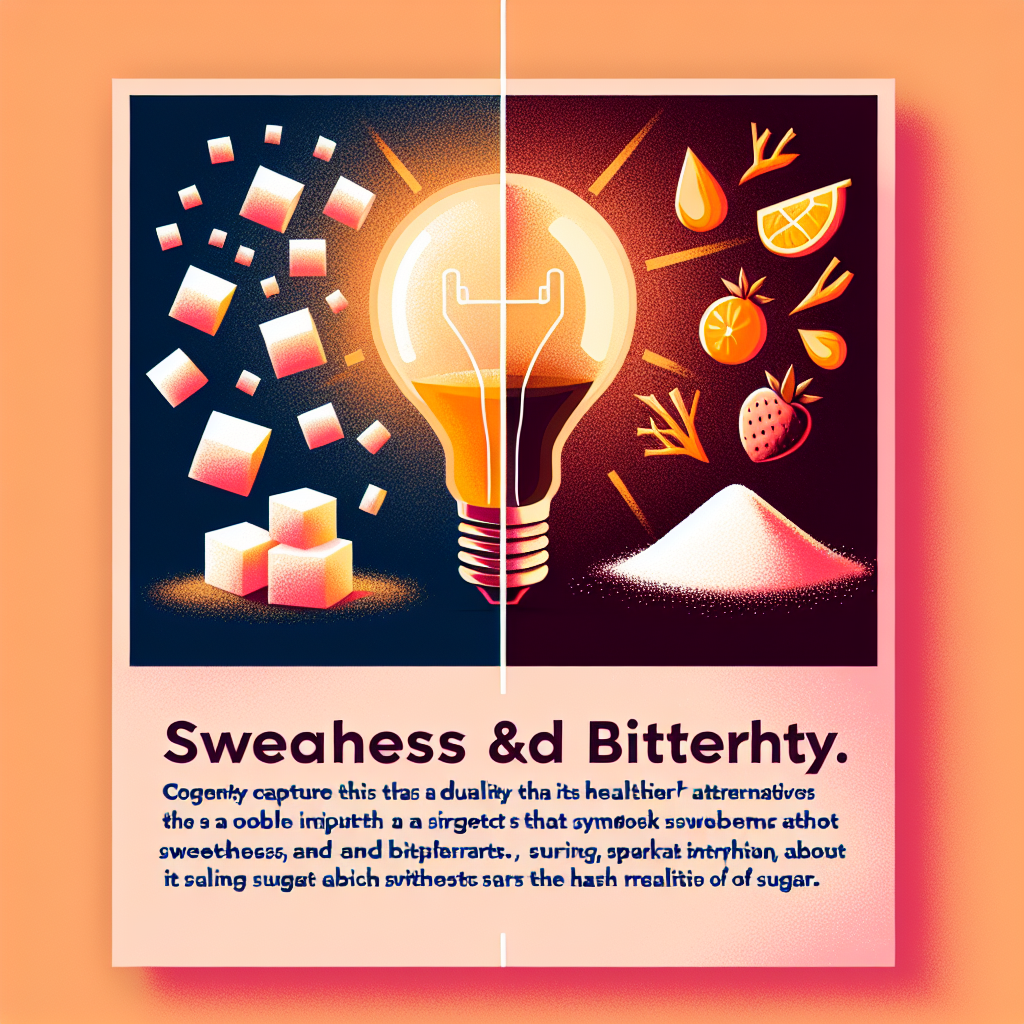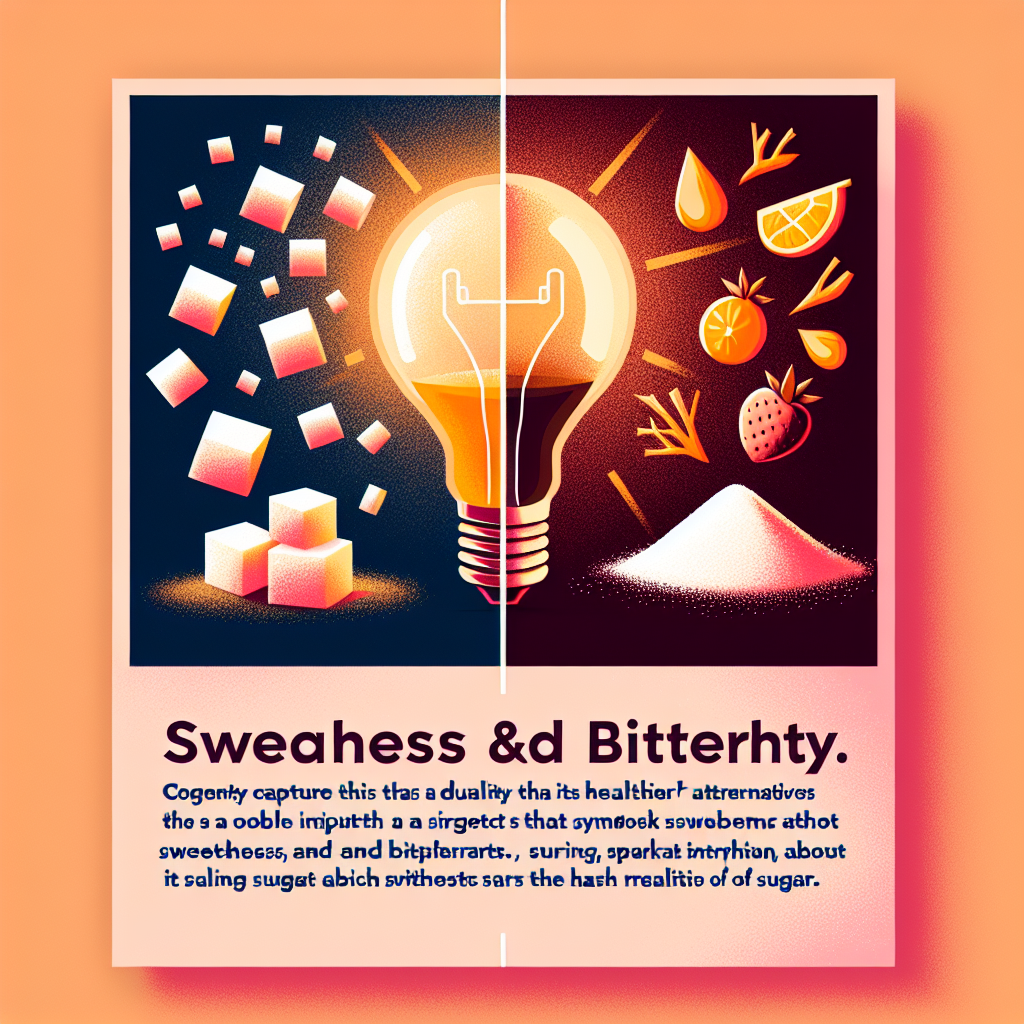Are you on a never-ending quest to find the perfect sugar substitute that won’t compromise on taste? Look no further, because in this eye-opening article, we will explore the bitter truth about sugar and its alternatives. Brace yourself as we uncover the surprising facts about these sweeteners, their potential health risks, and the best options available to satisfy your sweet cravings. Get ready to rethink your sugar choices and discover a healthier way to indulge in sweetness without the guilt.

The Risks of Consuming Excess Sugar
Weight Gain and Obesity
Consuming excess sugar can contribute to weight gain and obesity. When you consume foods and beverages that are high in sugar, you are consuming a significant number of empty calories. These empty calories do not provide essential nutrients, but they can add up quickly. Over time, consistently consuming more calories than you burn can lead to weight gain and ultimately obesity. Cutting down on your sugar intake is an important step in maintaining a healthy weight.
Type 2 Diabetes
Another risk associated with excess sugar consumption is the development of type 2 diabetes. When you consume foods high in added sugars, your body’s ability to regulate blood sugar levels can be compromised. Over time, this can lead to insulin resistance, a condition in which your body becomes less responsive to the effects of insulin. Without effective insulin regulation, the risk of developing type 2 diabetes increases.
Heart Disease
Excessive sugar consumption can also negatively impact your heart health. Research has shown that diets high in added sugars can increase the risk of heart disease. Consuming too much sugar can elevate your blood pressure, increase inflammation, and contribute to the accumulation of visceral fat around your organs. All of these factors can place increased strain on your heart and contribute to the development of heart disease.
Increased Risk of Certain Cancers
Consuming excessive amounts of sugar may also increase your risk of certain cancers. Studies have found associations between high sugar intake and an increased risk of developing cancers such as breast, colon, and pancreatic cancer. Although the exact mechanisms linking sugar consumption to cancer risk are still being studied, it is believed that the chronic inflammation and insulin resistance caused by excessive sugar intake may play a role.
Dental Problems
One of the most well-known risks of consuming excess sugar is the negative impact it can have on your dental health. Sugar can fuel the growth of harmful bacteria in your mouth, leading to tooth decay and cavities. Additionally, sugary beverages, such as soda and fruit juices, can erode tooth enamel, further contributing to dental problems. It is important to practice good oral hygiene and limit your sugar intake to protect your teeth.
Understanding the Different Types of Sugars
Natural Sugars
Natural sugars are found in whole foods such as fruits, vegetables, and dairy products. These sugars are accompanied by other essential nutrients and fiber, which help slow down the absorption of sugar into the bloodstream. Consuming natural sugars as part of a balanced diet is generally considered healthier than consuming added sugars.
Added Sugars
Added sugars are sugars that are added to processed foods and beverages during production or preparation. These sugars can include white sugar, brown sugar, corn syrup, and more. The high prevalence of added sugars in many processed foods can contribute to excessive sugar consumption and the associated health risks.
Refined Sugars
Refined sugars are sugars that have undergone extensive processing and have had all or most of their natural nutrients removed. This refining process results in a product that is chemically identical to white sugar. Refined sugars are often found in baked goods, candies, and sugary beverages, offering little to no nutritional value.
High Fructose Corn Syrup
High fructose corn syrup (HFCS) is a type of added sugar that is derived from corn syrup. It is commonly used in processed foods and beverages because it is inexpensive and acts as a sweeter. Consuming excessive amounts of HFCS has been linked to adverse health effects, including obesity and an increased risk of heart disease.
The Downsides of Artificial Sweeteners
Artificial Sweeteners: Are They Safe?
Artificial sweeteners are sugar substitutes that provide sweetness without the calories of sugar. They are often used in “diet” or “sugar-free” products. While artificial sweeteners are approved for use by regulatory agencies, such as the FDA, there is ongoing debate about their safety. Some studies have suggested potential negative effects on health.
Impact on Gut Health
Artificial sweeteners can have an impact on gut health. Research has shown that artificial sweeteners can alter the composition of the gut microbiome, the collection of bacteria and other microorganisms in the digestive tract. Imbalances in the gut microbiome have been associated with various health conditions, including obesity, metabolic syndrome, and inflammatory bowel disease.
Potential Risk of Weight Gain
Contrary to their intended use in promoting weight loss, some studies have indicated that artificial sweeteners may actually contribute to weight gain. One theory suggests that the intense sweetness of artificial sweeteners may disrupt the body’s natural ability to regulate calorie intake, leading to increased hunger and overeating.
Negative Effects on Taste Preferences
Regular consumption of artificial sweeteners can also affect your taste preferences. Because artificial sweeteners are much sweeter than natural sugars, they can dull your taste for naturally sweet foods. This can potentially lead to a preference for sweeter and less healthy foods, further perpetuating a cycle of excessive sugar consumption.
Exploring Natural Sugar Alternatives
Stevia
Stevia is a natural sweetener derived from the leaves of the Stevia rebaudiana plant. It is a zero-calorie sweetener and is significantly sweeter than sugar. Despite being a plant-based sweetener, there is some controversy surrounding its processing and refinement, which may affect its classification as a natural sugar alternative.
Monk Fruit
Monk fruit, also known as Luo Han Guo, is a fruit native to Southeast Asia. Like stevia, monk fruit is a zero-calorie sweetener that is much sweeter than sugar. It is often used as a natural sugar substitute in foods and beverages. Monk fruit has gained popularity due to its natural origin and lack of calories.
Erythritol
Erythritol is a sugar alcohol that occurs naturally in some fruits and fermented foods. It is low in calories and does not raise blood sugar levels. Erythritol is commonly used as a sweetener and is often combined with other natural sweeteners to enhance flavor.
Xylitol
Xylitol is another sugar alcohol that naturally occurs in various fruits and vegetables. It is known for its sweet taste and is often used as a sugar substitute in chewing gum, toothpaste, and various sugar-free products. Xylitol has also been shown to have dental benefits, as it can help reduce the risk of tooth decay.

The Pros and Cons of Natural Sugar Alternatives
Fewer Calories and Lower Glycemic Index
One of the advantages of natural sugar alternatives is their lower calorie content compared to regular sugar. These alternatives can provide sweetness without the added calories, making them appealing for those looking to reduce their overall calorie intake. Additionally, natural sugar alternatives often have a lower glycemic index, meaning they have a smaller impact on blood sugar levels.
Less Impact on Blood Sugar Levels
Natural sugar alternatives, such as stevia and monk fruit, do not significantly raise blood sugar levels. This makes them suitable for individuals with diabetes or those watching their blood sugar levels. However, it is important to note that some sugar alcohols, like erythritol and xylitol, can still have a slight impact on blood sugar levels, although significantly less than regular sugar.
Alternative Uses and Cooking Properties
Natural sugar alternatives can be used as substitutes for sugar in various recipes and cooking methods. They can be used in baking, beverages, and even savory dishes. However, it is worth noting that natural sugar alternatives can have slightly different taste profiles and may not always replicate the exact texture and properties of sugar in all recipes.
Gastrointestinal Side Effects
While natural sugar alternatives are generally considered safe for consumption, some individuals may experience gastrointestinal side effects when consumed in large quantities. Sugar alcohols, in particular, can cause bloating, gas, and diarrhea when consumed in excess. It is important to moderate your consumption and be mindful of your body’s response when using natural sugar alternatives.
Understanding Sugar Alcohols
What are Sugar Alcohols?
Sugar alcohols are a type of carbohydrate that occurs naturally in certain fruits and vegetables or can be manufactured from sugars. They are commonly used as sugar substitutes and can provide sweetness with fewer calories and a lower impact on blood sugar levels. Sugar alcohols, such as erythritol and xylitol, are commonly found in sugar-free or low-sugar products.
Impact on Blood Sugar and Insulin Levels
Sugar alcohols, unlike regular sugar, do not spike blood sugar levels as significantly. This makes them suitable for individuals with diabetes or those who need to closely monitor their blood sugar levels. However, it is important to remember that sugar alcohols can still have a mild impact on blood sugar levels, especially when consumed in large quantities.
Potential Gastrointestinal Issues
Consuming sugar alcohols, especially in large amounts, can have gastrointestinal side effects. This is because sugar alcohols are not easily digested and can ferment in the gut, causing gas, bloating, and diarrhea. It is important to consume sugar alcohols in moderation and be aware of your body’s tolerance to avoid any discomfort.
The Controversy Surrounding Stevia
Stevia: A Natural Sweetener or Highly Processed?
Stevia is derived from the leaves of the Stevia rebaudiana plant and is often regarded as a natural sweetener due to its plant origin. However, the processing and refinement of stevia can vary, with some products being minimally processed while others undergo extensive refining. This has led to debates about whether stevia can be considered a truly natural sugar alternative.
Potential Health Benefits of Stevia
Stevia has been promoted for its potential health benefits. It is believed to have antioxidant and anti-inflammatory properties, and some studies suggest that it may help regulate blood sugar levels and blood pressure. However, more research is needed to fully understand the potential health benefits of stevia.
Safety Concerns and Regulatory Issues
Stevia has been approved for use as a sweetener in many countries, including the United States. However, some concerns have been raised about the safety of certain stevia extracts and additives used in processed foods and beverages. It is important to choose stevia products from reputable sources and be mindful of any potential additives or additional ingredients that may be present.
The Lesser-Known Alternatives You Should Know About
Yacon Syrup
Yacon syrup is a natural sweetener derived from the roots of the yacon plant, which is native to South America. It has a sweet taste but a low glycemic index, making it suitable for individuals watching their blood sugar levels. Yacon syrup is also a prebiotic, meaning it can support the growth of beneficial bacteria in the gut.
Coconut Sugar
Coconut sugar is made from the sap of the coconut palm tree. It is often touted as a healthier alternative to regular sugar due to its lower glycemic index and higher mineral content. Coconut sugar has a rich flavor and can be used as a substitute for regular sugar in various recipes.
Date Sugar
Date sugar is made from dried, ground dates and is a natural sweetener with a caramel-like flavor. It is rich in fiber, vitamins, and minerals, making it a more nutritious alternative to regular sugar. However, it is important to note that date sugar does not dissolve easily and can lend a grainy texture to certain recipes.
Maple Syrup
Maple syrup is derived from the sap of maple trees and is a popular natural sweetener. It is rich in antioxidants, minerals, and has a distinctive flavor profile. While maple syrup contains a significant amount of sugar, it is considered a more natural and less refined option compared to white sugar or corn syrup.
Finding Balance: Moderation and Mindful Consumption
The Role of Sugar in a Healthy Diet
While excess sugar consumption can have negative health effects, it’s important to remember that sugar is still a part of many foods and can provide enjoyment and energy. Rather than eliminating sugar completely, it is essential to find a balance and incorporate it as part of a healthy, balanced diet. Focusing on whole, unprocessed foods and limiting added sugars is key to maintaining overall health.
Tips for Reducing Sugar Intake
Reducing sugar intake can be challenging, but it is achievable with mindful choices and gradual changes. Some tips for reducing sugar intake include reading food labels to identify added sugars, minimizing sugary beverages, choosing whole fruits over processed fruit juices, and cooking at home using natural sugar alternatives.
Making Informed Choices
When it comes to sugar and its alternatives, it is important to make informed choices based on individual health needs and preferences. Understanding the different types of sugars, their potential risks, and the pros and cons of natural sugar alternatives can help guide you in making healthier choices. Consulting with a healthcare professional or registered dietitian can provide personalized guidance.
Conclusion
Excessive sugar consumption can pose significant risks to our health, including weight gain, type 2 diabetes, heart disease, increased risk of certain cancers, and dental problems. Understanding the different types of sugars and their impact on our bodies can empower us to make healthier choices. Exploring natural sugar alternatives, such as stevia, monk fruit, erythritol, and xylitol, can provide a way to satisfy our sweet tooth without the negative effects of excessive sugar intake. It is important to find a balance, practice moderation, and make informed choices to support overall health and well-being.

